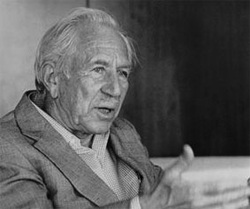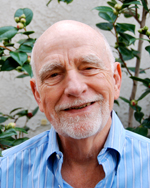 Alexander Lowen, MD, the founder of Bioenergetic Analysis is interviewed with Frank Hladky, MD. I am fortunate to have been trained by Dr Hladky and to have participated in workshops given by Dr Lowen. Alexander Lowen (December 23, 1910 – October 28, 2008) was an American physician and psychotherapist. A student of Wilhelm Reich (an associate of Sigmund Freud, MD) in the 1940s and early 1950s in New York, he developed bioenergetic analysis, a form of mind-body psychotherapy, with his then-colleague, John Pierrakos (February 8, 1921 – February 1, 2001). Lowen was the founder and former executive director of the International Institute for Bioenergetic Analysis in New York City. Born in New York City, Lowen received a bachelor's degree in science and business from City College of New York, an LL.B and a J.S.D (a doctorate in law) from Brooklyn Law School. His interest in the link between the mind and the body developed during this time. He enrolled in a class on character analysis with Wilhelm Reich. After training to be a therapist himself, Lowen moved to Switzerland to attend the University of Geneva. Lowen lived and practiced for the majority of his life in New Canaan, Connecticut. He suffered a stroke in July 2006. The Alexander Lowen Foundation was founded in April 2007 to continue his legacy. Lowen died on October 28, 2008 at the age of 97. In this 30 minute conversation with Dr. Stephen Sinatra and Holly Hatch, director of behavioral services at The New England Heart Center, Dr. Alexander Lowen discusses the importance of sex and love in preventing heart disease and other health problems. To purchase the book and ebook Love, Sex, and Your Heart by Alexander Lowen, M.D. visit Lowen Foundation store at http://www.lowenfoundation.org/store Dr. Scott Baum presents an understanding of the development of psychopathy as a defensive organization and as character structure from a bioenergetic developmental perspective. He discusses the clinical manifestations of these psychological organizations and the challenges to the therapist in working with people dealing with these personality problems. The presentation is most suited for use by therapists. Dr. Baum is a licensed Clinical Psychologist and a Diplomate in Clinical Psychology. He is also a certified Bioenergetic Therapist, and a member of the Faculty of The International Institute for Bioenergetic Analysis. He has been affiliated with the DiMele Center for Psychotherapy since 1994. Scott Baum views psychotherapy as an experiential, problem solving process. He believes that the deepest, fullest, and most complex understanding of a person’s problem yields the best, most creative and enduring results. Audio level and quality is not very good, but still quite audible. This 3 part YouTube video is very much worth watching. I have attended several workshops by Dr Scott Baum and highly recommend these presentations. These rare clips are from the BBC archives, parts of which are featured in Adam Curtis' film Century of the Self. Alexander Lowen (December 23, 1910 – October 28, 2008) was an American physician and psychotherapist. A student of Wilhelm Reich in the 1940s and early 1950s in New York, he developed bioenergetic analysis, a form of mind-body psychotherapy, with his then-colleague, John Pierrakos (February 8, 1921 – February 1, 2001). Lowen was the founder and former executive director of the International Institute for Bioenergetic Analysis in New York City. Born in New York City, Lowen received a bachelor's degree in science and business from City College of New York, an LL.B and a J.S.D (a doctorate in law) from Brooklyn Law School. His interest in the link between the mind and the body developed during this time. He enrolled in a class on character analysis with Wilhelm Reich. After training to be a therapist himself, Lowen moved to Switzerland to attend the University of Geneva and received his Doctorate in Medicine (MD) in 1951. Alexander Lowen met Wilhelm Reich in New York in 1940, and trained with him until 1952. He studied Reich's energy principles and character analysis. He also had personal therapy with Reich from 1942 to 1945 before becoming a Reichian therapist himself. In 1953, he split from Reich and his research on the "orgone". Lowen then developed "Bioenergetic Analysis" as his own creative contribution to help people clarify the complexity of the mind-body split. Lowen lived and practiced for the majority of his life in New Canaan, Connecticut. He suffered a stroke in July 2006. The Alexander Lowen Foundation was founded in April 2007 to continue his legacy. Lowen died on October 28, 2008 at the age of 97. Books authored by Dr Alexander Lowen:
Albert Pesso is the co-creator, along with his wife Diane Boyden-Pesso, of Pesso Boyden System Psychomotor, a widely respected interactive technique that helps clients create new memories to compensate for emotional deficits in the past. He has been called one of the three living masters of body-based psychotherapy and was chosen to receive a Lifetime Achievement Award by the United States Association For Body Psychotherapy. Now, octogenarians, Al began his career as a dancer and choreographer, studying under the renowned Martha Graham while Diane received her training from the legendary Jose Limon and Ziegfield Follies star, Harriet Hoctor. They met as students at Bennington College, then married and danced together in New York City for several years. In 1956, Al and Diane established their own dance center in Massachusetts. Five years later, the pair developed what would become the foundational theory of PBSP. As they encouraged dancers to allow their bodies to act out their inner feelings, Al and Diane observed that the resulting emotional outpouring was cathartic, but did not necessarily help the individual heal his or her emotional scars. They went on to develop an interactive model that drew on spatial relationships, specific wording, and physical touch to provide a response from the outer world to each of the inner needs expressed by the individual. This, the pair ultimately concluded, facilitated the creation of new body-based memories to complement the memories of emotional deficits in the past. Both Al and Diane retained a foothold in the dance world — he as a tenured associate professor and director of the dance department at Emerson College, she on the faculty of Wheaton College, Emerson College, and Sargent College of Boston University — even as they developed and began teaching their new form of body-based psychotherapy. In the 50 years since developing PBSP, Al has served as director of Psychomotor Therapy at both McLean Hospital (Belmont, MA) and in the Pain Unit of New England Rehabilitation Hospital; as adjunct professor for California’s Fielding Institute; and as a consultant in psychiatric research at the Veterans Administration Hospital in Boston. He has also taught courses on PBSP in the Harvard University continuing education program and other educational and medical institutions abroad. Clients have included top executives of multinational corporations, high profile entertainers and individuals from every walk of life. Al Pesso has written or contributed to almost a dozen books, written more than 50 articles, and led hundreds of seminars around the world. He has been a featured speaker at the conferences of many psychology organizations, such as: the American Academy of Psychotherapists; the Association of Humanistic Psychology; the National Institute for the Clinical Application of Behavioral Medicine; the Berlin Psychoanalytic Institute; the European Congress on Body Psychotherapy; the American Association of Marriage and Family Therapy; the American Association of Sex Educators, Counselors and Therapists; and a host of others on three continents. He has also been invited to make presentations at numerous medical schools and hospitals, including Grand Rounds at Boston University Medical School. Al spends much of his time on the road, training new PBSP therapists and counseling clients. Diane, now retired, continues to advise on the development of training programs and new techniques. Friedrich (Fritz) Perls was born in 1893 in Berlin. Against his family’s wishes, Perls served in the army during World War I. After the war, Perls studied medicine and began treating soldiers with brain injuries. He was drawn to the work of Sigmund Freud as a teenager, and his experiences treating patients pulled him further down the path toward Freudian psychoanalysis. He studied at the Berlin Institute of Psychoanalysis and in Vienna. In 1930, Perls married Lore Posner, later known as Laura Perls; the couple had two children and fled the Hitler regime by relocating to Johannesburg, South Africa, in 1933. There, Perls founded a training institute to serve the psychoanalytical community. During World War II, Perls again joined the military and became a psychiatrist with the South African army. In 1946, the Perls family moved to New York where Perls worked briefly with Wilhelm Reich and Karen Horney. Perls eventually settled in Manhattan and began working with the intellectual Paul Goodman. In 1951, in collaboration with Ralph Hefferline, Goodman and Perls produced the book Gestalt Therapy: Excitement and Growth in the Human Personality, based mostly on Perl’s own research and clinical notes. Shortly after the publication in 1951, the Perls founded the New York Institute for Gestalt Therapy and began conducting training from their apartment in Manhattan. Perls began sharing his theories with all of North America and began traveling extensively to conduct seminars and training workshops. Later in life, Perls moved to California and became affiliated with the Esalen Institute, in 1964, where he provided workshops and continued to practice and develop Gestalt therapy. In 1969, Perls moved to Vancouver Island, Canada, to establish a training community for therapists. He died the following year in Chicago. (Excerpts taken from GoodTherapy.org.) Ron Kurtz was the originator of Hakomi Therapy and the founder of the Hakomi Institute. Ron began to develop Hakomi in the 1970’s. With a background in science, mathematics, and computer engineering, Ron wrote: “My passion has been systems theory, especially the branch that studies living systems.” Following graduate training in experimental psychology, Ron first taught at San Francisco State College, also leading encounter groups, and studying Gestalt. He became a client of John Pierrakos, founder of Bioenergetics, began to read the work of Wilhelm Reich and Alexander Lowen, and was inspired by the work of Albert Pesso. He describes these experiences as “the beginnings of the Hakomi Method”. A practitioner of yoga since 1959, he was also strongly influenced by Buddhism and Taoism. He studied with Moshe Feldenkrais and received Rolfing sessions. He says, “All of this found its way into my thinking, my work and my writing… These threads: eastern philosophy, psychotherapeutic technique, and systems theory are the foundations of Hakomi.” Stanley Keleman’s interest in the body has always been experientially based, beginning with an early involvement in athletics and continuing in his education at the Chiropractic Institute of New York, where he graduated in l954. After starting his practice as a clinician, he began to observe the relationship between emotional conflict, organismic movement and distortions of body posture. Following his interest, he initiated a program of training and research into the life of the body. He became a member in 1957 of Alexander Lowen’s Institute for Bioenergetic Analysis and was, until the l970’s, a senior trainer. He attended the Alfred Adler Institute and his thinking was affected profoundly by Adler’s ideas on the relationship of the state of the organism to its functioning, the will to power, and the role of society in personality development. This education and training balanced the characterological approaches of Lowen, Freud, and Reich. In 1967, he moved to California where he interned at Esalen Institute in group dynamics and was exposed to humanistic psychology, the leading edge of psychology at the time. There in an atmosphere of cultural revolution, he established his form of working bodily. The interaction with many leaders of the humanistic movement – Carl Rodgers, Fritz Perls, Virginia Satir, Alan Watts and others – provided a forum for his ideas. He met Joseph Campbell, the mythologist, and began a fifteen year association, teaching an annual program in which they developed connections between myth and the body. These workshops evolved into the annual programs taught by Stanley in Berkeley and Solingen Germany that connect dreams, body and the formative process. His commitment to understanding the life of the body keeps him abreast of the changes in modern biology, neurobiology and molecular dynamics all of which help him understand how the body develops and matures. Along with his vision and philosophy, he has developed Formative Psychology®, an original methodology for teaching individuals how to participate in their own formative process. His pioneering efforts continue to take him into the forefront of learning how the body shapes itself over time, through all of life’s stages. His Formative Psychology® methodology rests firmly on an anatomical and physiological base, as well as a psychological and mythological understanding. The Formative Psychology® approach deals with the human condition in its societal and evolutionary thrust toward forming a personal somatic self. Tami Simon speaks with Mario Martinez, a clinical neuropsychologist whose breakthrough research examines how cultural beliefs affect our health and longevity. Mario is the founder of biocognitive science, a new paradigm that examines the dynamic relationship between thoughts, culture, and the body. In this episode, Tami speaks with Mario about the idea that culture creates biology; how we can access the antidote to shame, abandonment, and betrayal through healing fields in the body; and the concept of "the drift"—how we can navigate chaos with uncertainty as our guide. Robert Hilton  Robert Hilton, Ph.D has been in private practice in Orange County, California for 45 years and has taught courses at the University of California at Irvine and San Diego, and the United States International University in La Jolla. In 1972 he co-founded the Southern California Institute for Bioenergetic Analysis where he continues to be a senior trainer. He is a member of the American Psychological Association, the California Association of Marriage and Family Counselors and the International Institute for Bioenergetic Analysis where as a senior faculty member emeritus he lectures at their International conferences as well as teaching throughout Europe, the United States and South America. In addition to his many publications he is the author of Relational Somatic Psychotherapy: Collected Essays of Robert M. Hilton, Michael Sieck, editor. Printable PDF transcript. (Original from: Somatic Perspectives on Psychotherapy) |
AuthorHomayoun Shahri Archives
May 2016
Categories
All
|
Ravonkavi Privacy Policy
©2018 Ravonkavi
©2018 Ravonkavi

 RSS Feed
RSS Feed